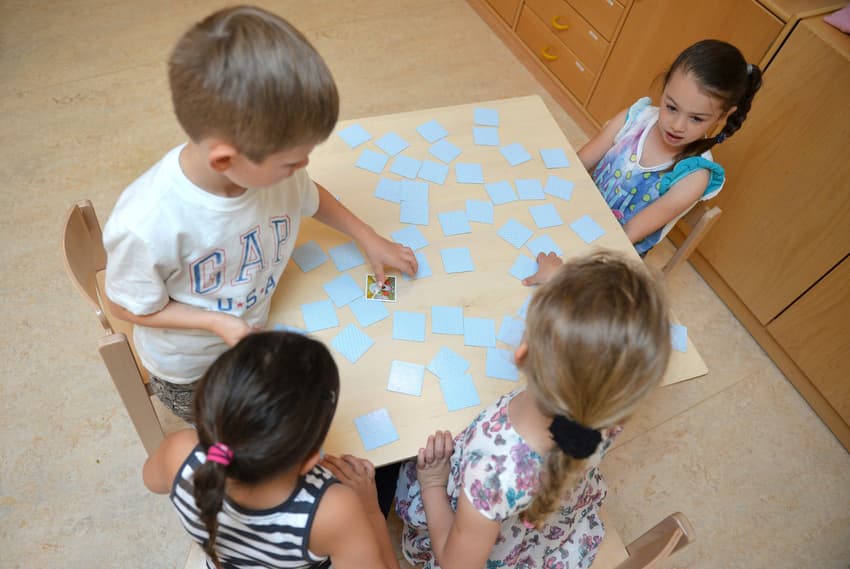Germany’s first 'democratic kindergarten' gives tiny tots a vote

Should preschoolers have a say in their day care routines? A new kindergarten in northern Germany is taking the idea to a new level.
The Dolli-Einstein-Haus in Pinneberg, Schleswig-Holstein seems like any other preschool facility in Germany, but its main concept is quite new, the Süddeutsche Zeitung (SZ) reported on Monday.
The kindergarten - which in Germany starts at age three - allows its tiny pupils to vote on certain aspects of their daily routine, often revolving around food.
Kids will, for example, place little glass stones in differently marked boxes to vote for which flavour of cake they want to eat next, the Hamburger Abendblatt reports. A majority vote decides the outcome.
“For us it’s a matter of having normal, basic work that functions when adults understand on what they can allow the kids to decide,” school head Ute Rodenwald told the SZ.
The aim is to teach the kids early about rights and the democratic process.
“Children can differentiate between and deal with various situations very well,” deputy head Heike Schlüter told the Hamburger Abendblatt in January.
The little voting conferences happen once a week, and also include hotly debated topics like new toys for the outdoor play area. The kids also get to choose a representative from their groups to bring their decisions to the greater “kids’ council”. And the election process ensures that votes are kept anonymous.
The school got its official certificate to launch in January, but its founding educators had worked for years to produce a “constitution” for the kids. Within it are seven fundamental rights for the children, and explanations of the limits of what the kids can vote for. For example, they may not decide whether or not they need diapers.
“A child cannot assess what it means to run around the whole day with the same diaper,” said school worker Melanie Markner.
When deciding on meals, the children are also limited in their choices. They may, for example, vote on designated choices of fish sticks with lots of side dishes, or fish sticks with just peas, or perhaps just peas with mashed potatoes. They could even vote to have none of the above, which can be testing for the kindergarten staff.
“You have to tolerate this,” said Rodenwald.
State social affairs minister Kristin Alheit praised the concept.
“People can and should learn about democracy,” Alheit said. “When kids take part and are taken seriously, that shapes them for life.”
Comments
See Also
The Dolli-Einstein-Haus in Pinneberg, Schleswig-Holstein seems like any other preschool facility in Germany, but its main concept is quite new, the Süddeutsche Zeitung (SZ) reported on Monday.
The kindergarten - which in Germany starts at age three - allows its tiny pupils to vote on certain aspects of their daily routine, often revolving around food.
Kids will, for example, place little glass stones in differently marked boxes to vote for which flavour of cake they want to eat next, the Hamburger Abendblatt reports. A majority vote decides the outcome.
“For us it’s a matter of having normal, basic work that functions when adults understand on what they can allow the kids to decide,” school head Ute Rodenwald told the SZ.
The aim is to teach the kids early about rights and the democratic process.
“Children can differentiate between and deal with various situations very well,” deputy head Heike Schlüter told the Hamburger Abendblatt in January.
The little voting conferences happen once a week, and also include hotly debated topics like new toys for the outdoor play area. The kids also get to choose a representative from their groups to bring their decisions to the greater “kids’ council”. And the election process ensures that votes are kept anonymous.
The school got its official certificate to launch in January, but its founding educators had worked for years to produce a “constitution” for the kids. Within it are seven fundamental rights for the children, and explanations of the limits of what the kids can vote for. For example, they may not decide whether or not they need diapers.
“A child cannot assess what it means to run around the whole day with the same diaper,” said school worker Melanie Markner.
When deciding on meals, the children are also limited in their choices. They may, for example, vote on designated choices of fish sticks with lots of side dishes, or fish sticks with just peas, or perhaps just peas with mashed potatoes. They could even vote to have none of the above, which can be testing for the kindergarten staff.
“You have to tolerate this,” said Rodenwald.
State social affairs minister Kristin Alheit praised the concept.
“People can and should learn about democracy,” Alheit said. “When kids take part and are taken seriously, that shapes them for life.”
Join the conversation in our comments section below. Share your own views and experience and if you have a question or suggestion for our journalists then email us at [email protected].
Please keep comments civil, constructive and on topic – and make sure to read our terms of use before getting involved.
Please log in here to leave a comment.